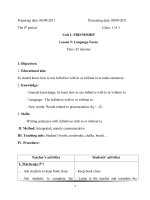Unit 02-Language focus- 0988 055 990
Bạn đang xem bản rút gọn của tài liệu. Xem và tải ngay bản đầy đủ của tài liệu tại đây (890.76 KB, 18 trang )
Read the text about Pippa Wilson &
answer some questions
Pippa Wilson is studying marketing at university.
She enjoys travelling and would probably like to
work for a tour company. “I’m not sure yet exactly
what I want to do. After university, I’m going to
have a year off and I’m going round the world with
another girl. We hope to find work on the way.”
1. What is P.W doing?
2. What does she enjoy doing?
3. What does she plan to do after university?
She .
She to have a year off and go round the
world with another girl.
enjoys
travellin
g
plans
Gerund (V-ing)
to infinitive
Unit 1:
Unit 1:
SCHOOL TALKS
SCHOOL TALKS
LANGUAGE FOCUS:
LANGUAGE FOCUS:
GERUNDS & INFINITIVES
GERUNDS & INFINITIVES
UNIT1: GERUNDS & INFINITIVES
SOME EXCEPTIONS
+ V-ing
1. Prepositions (in, on, at, about, for, to )
+ V-ing
Note: " To " in these expressions is a preposition.
* be accustomed to
= be used to = get used to
* be committed to: cam kết, hứa làm gì
* be devoted to: hết lòng, tận tuỵ với
* be opposed to: phản đối
* look forward to: trông mong, mong đợi
* in addition to: ngoài ra
* object to: phản đối
* be resigned to
: cam chịu
Ex: Thank you for helping carry the packages to the post office.
: quen làm gì
Ex: Thank you for helping carry the packages to the post office.
*
Prefer + (v-ing) TO + (v+ing) = prefer to do St than (do)
St: thích làm gì hơn làm gì
* would prefer + to inf. = would rather + bare inf.
Ex: Well, I’d prefer to go by car.
* would prefer + to inf. + rather than + bare inf.
Ex: I’d prefer to stay at home tonight rather than go
to the cinema.
(= Well, I’d rather go by car.)
+ V-ing
2.
2. Adjectives (happy, interesting, easy )
+ to-infinitives
But: busy
worth (đáng làm gì)
Ex: I was surprised to see Tim at the party.
This book is worth reading.
3. Some SPECIAL EXPRESSIONS followed by Gerund (V-ing)
* go + V-ing
Ex: go swimming, go shopping, go skiing, go fishing
* can't help (không thể không, không thể nhịn được) + V-ing
Ex: I can't help worrying about it.
2.
* It’s no use / It’s no good /There’s no point in …
(chẳng có ích lợi gì)
+ V-ing
Ex: It’s no good trying to persuade me. You won’t succeed.
There’s no point in buying a car if you never use it.
* have fun / a (good / hard) time
have difficulty / trouble …
+ V-ing
Ex: I had difficulty finding a place to live.
We had fun playing volleyball.
* spend
waste
+ time / money + V-ing
Ex: Sam spends most of his time studying.
She wastes a lot of time watching TV.
Note: a waste of time / money + V-ing
* sit / stand / lie + (adverb of place) + V-ing
Ex: I stood there wondering what to do next.
He is lying in bed reading a novel.
* find
catch
+ O + V-ing
Ex: When I walked into my office, I found George using my telephone.
* need + to-infinitives (if the subjects are persons)
need + V-ing / to be + PP (if the subjects are things)
Ex: I need to borrow some money.
The house needs painting / to be painted.
* make
let
+ O V (bare
infinitives)
Ex: Mrs Lee made her son clean his room.
My father let me drive his car.
* have + O (persons) + V (bare infinitives)
have + O (things) + V(PP)
= ask + O + to
infinitives
Ex: Jane had the waiter bring her some tea.
I had my watch repaired by someone.
4. Verbs of perceptions
. see, notice, watch, look at, observe
. hear, listen to
. feel
. smell
+ O + V-ing /
bare infinitives
Ex: I saw my friend run / running down the street.
I heard the rain fall / falling on the roof.
5. Some verbs are followed by either to infinitives or V-ing
with no difference in meaning
* begin, start, continue, like,
love, hate, can't stand = can't
bear (không thể chịu đựng được)
+ O + V-ing
Ex: It began to rain / raining.
But It was beginning to rain.
6. Some verbs followed by either to infinitives or V-ing with
a difference in meaning
* a. remember
forget
regret
V-ing / to infinitives
remember to do St
remember doing St
Ex: Judy always remembers to lock the door before she leaves home.
It began to get cold and he regretted not wearing his coat.
Note: regret to say / to tell / to inform you that
Ex: We regret to inform you that we cannot offer you the job.
b. try to do St:
try doing St:
attempt to do, make an effort to do
do St as an experiment or test
Ex: I'm trying to learn English.
The room was hot. I tried opening the window, but that
didn't help, so I tried turning on the fan, but I was
still hot. Finally, I turned on the air conditioner.
c. stop to do St:
stop doing St:
stop SO (from) doing St =
prevent SO from doing St
Ex: I stopped to ask the way to the airport.
He stopped smoking 3 months ago.
I can't stop him talking to the press.
Task a: Put the verbs into the correct form
1. I was very tired. I tried my eyes open but I couldn’t.
(keep)
2. She told him the door. (lock)
3. My father allowed me his camera. (use)
4. I want the truth. (know)
5. When I was tired, I enjoy television. It’s relaxing.(watch)
6. It was a nice day, so we decided for a picnic. (go)
7. I’m not in a hurry. I don’t mind (wait)
8. We were hungry, so I suggested dinner early.
(have)
to keep
to lock
to use
to know
watching
to go
waiting
having
Task b: Put the verbs into the correct form
1. I wish I hadn’t sold my motorbike.
2. Students were eager to see their new teacher.
3. By chance I saw your sister yesterday.
4. Would you like to go for a walk?
5. I usually arrive at school five minutes early.
(regret)
(wait)
(happen)
(fancy)
(tend)
I regret selling my motorbike.
Students can’t wait to see their new teacher.
I happened to see your sister yesterday.
Do you fancy going for a walk?
I usually tend to arrive at school five minutes early.
6. Peter hates getting up early in winter.
7. My group continued to seek information for our class
presentation.
8. My visit to Ha Long Bay will always stay in my memory.
(stand)
(carry)
(forget)
Peter can’t stand getting up early in winter.
My group carried on seeking information for our class
presentation.
I will never forget visiting Ha Long Bay.
Homework:
Exercise 3: textbook, p.81
Exercise 4: Workbook, p.44-45)









